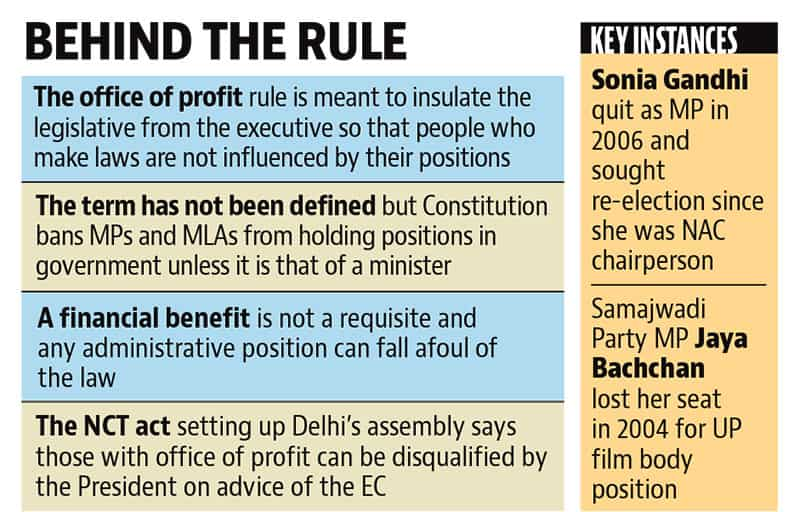What is office of profit?
Context
-
Ramesh Bais, who was transferred as Governor of Maharashtra, has left the Raj Bhavan in Ranchi without making public the Election Commission’s opinion on whether Chief Minister of Jharkhand should be disqualified for allegedly allocating a mining lease to himself when he was the mining and forest minister of Jharkhand.
Under what law was the matter referred to the EC?
- Articles 191 and 192 of the Constitution deal with “Disqualifications for membership” of a state Legislative Assembly or Council, and “Decision on questions as to disqualifications of members” respectively.
- Article 191(1) says that “a person shall be disqualified for being chosen as, and for being, a member” of a state House “if he holds any office of profit under the Government of India or the Government of any State…, other than an office declared by the Legislature…not to disqualify its holder”.
- Article 192(1) states that if “any question arises as to whether a member…has become subject to…disqualification…, the question shall be referred for the decision of the Governor and his decision shall be final”.
- Under Article 192(2), “Before giving any decision on any such question, the Governor shall obtain the opinion of the Election Commission and shall act according to such opinion.”
- Also, Section 9A (“Disqualification for Government contracts, etc.”) of The Representation of the People Act, 1951, states: “A person shall be disqualified if, and for so long as, there subsists a contract entered into by him in the course of his trade or business with the appropriate Government for the supply of goods to, or for the execution of any works undertaken by, that Government.”
Is the Governor bound to act in accordance with the EC’s opinion?
- Article 192(2) says that the Governor “shall act” according to the EC’s opinion. However, it does not lay down a time frame for the Governor to act.

Back to Basics
What is the concept of ‘office of profit’?
- MPs and MLAs, as members of the legislature, hold the government accountable for its work.
- The essence of disqualification under the office of profit law is if legislators holds an ‘office of profit’ under the government, they might be susceptible to government influence, and may not discharge their constitutional mandate fairly.
- The intent is that there should be no conflict between the duties and interests of an elected member.
- Hence, the office of profit law simply seeks to enforce a basic feature of the Constitution- the principle of separation of power between the legislature and the executive.
According to the definition, what constitutes an ‘office of profit’?
- The law does not clearly define what constitutes an office of profit but the definition has evolved over the years with interpretations made in various court judgments.
- The origin of this term can be found in the English Act of Settlement, 1701.
- Under this law, “no person who has an office or place of profit under the King, or receives a pension from the Crown, shall be capable of serving as a member of the House of Commons.”
- This was instituted so that there wouldn’t be any undue influence from the royal household in administrative affairs.
- An office of profit has been interpreted to be a position that brings to the office-holder some financial gain, or advantage, or benefit. The amount of such profit is immaterial.
- In 1964, the Supreme Court ruled that the test for determining whether a person holds an office of profit is the test of appointment. Several factors are considered in this determination including factors such as:
-
- (i) whether the government is the appointing authority,
- (ii) whether the government has the power to terminate the appointment,
- (iii) whether the government determines the remuneration,
- (iv) what is the source of remuneration, and
- (v) the power that comes with the position.
-
Is there a bar on how many offices can be exempted from the purview of the law?
- There is no bar on how many offices can be exempted from the purview of the law.
Visit Abhiyan PEDIA (One of the Most Followed / Recommended) for UPSC Revisions: Click Here
IAS Abhiyan is now on Telegram: Click on the Below link to Join our Channels to stay Updated
IAS Abhiyan Official: Click Here to Join
For UPSC Mains Value Edition (Facts, Quotes, Best Practices, Case Studies): Click Here to Join
